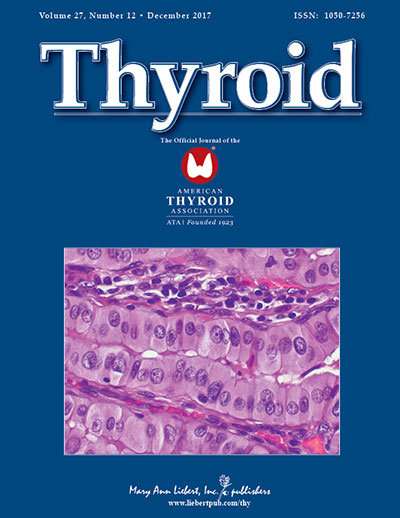How did the Fukushima nuclear power plant accident impact thyroid cancer risk?

New lessons are being learned about risk assessment and predicting the extent of thyroid cancer occurrence following radiation exposure due to a nuclear power plant accident such as the one in March 2011 in Fukushima Prefecture of Japan. The article entitled "Lessons from Fukushima: Latest Findings of Thyroid Cancer after the Fukushima Nuclear Power Plant Accident," is part of a special section on Japanese Research led by Guest Editor Yoshiharu Murata, Nagoya University, Japan, in the January 2018 issue of Thyroid.
Coauthors Shunichi Yamashita, Shinichi Suzuki, Satoru Suzuki, Hiroki Shimura, and Vladimir Saenko, from Fukushima Medical University and Nagasaki University, Japan discuss the implications of the results of two rounds of large-scale ultrasound screening, which detected a relatively high rate of thyroid cancer in young individuals from the Fukushima area. The researchers examine the challenges in distinguishing radiation-induced thyroid cancer from thyroid cancer that develops spontaneously and thus the difficulty in establishing a causal relationship. They explore in detail numerous topics, including studies of the link between radiation exposure, thyroid cancer, and related genetic alterations; the occurrence of thyroid cancer after the Chernobyl nuclear power plant accident, hereditary factors that may increase a person's susceptibility to radiation-induced thyroid cancer, and the findings from children, adolescents, and young adults in Fukushima with thyroid cancer treated with surgery.
"The careful study of the nuclear accidents in Chernobyl and Fukushima on health and societal issues continues to be highly informative. At this point, there is no clear evidence that the Fukushima accident has resulted in an increased incidence of thyroid carcinomas, a finding that contrasts with the observations after the Chernobyl accident," says Peter A. Kopp, MD, Editor-in-Chief of Thyroid and Professor of Medicine, Division of Endocrinology, Metabolism, and Molecular Medicine, Northwestern University Feinberg School of Medicine, Chicago, IL. "The relatively high incidence of thyroid malignancies detected through the screening of the Fukushima population highlights the challenges associated with screening programs. However, any definite conclusion would be premature, and continuing observation of the Fukushima population, as well as detailed characterization of the genetic and pathological alterations in the detected thyroid carcinomas, remain important. Our Japanese colleagues are to be commended on the rigorous approach to this highly important public health problem."
More information: Shunichi Yamashita et al, Lessons from Fukushima: Latest Findings of Thyroid Cancer After the Fukushima Nuclear Power Plant Accident, Thyroid (2017). DOI: 10.1089/thy.2017.0283















